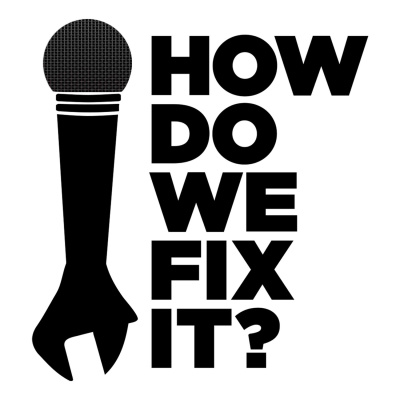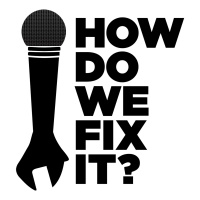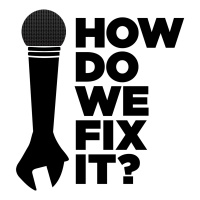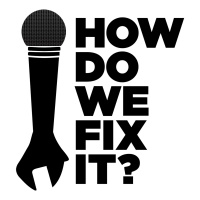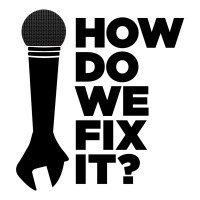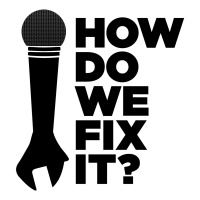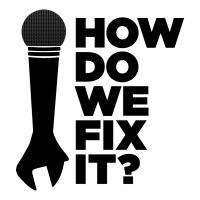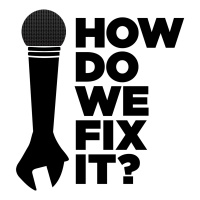Synopsis
From politics to the personal, we're about solutions. Our weekly podcast features two friends and longtime journalists. Join Richard Davies (ABC News) and Jim Meigs (Popular Mechanics) as they challenge authors, experts and provocateurs in a search for positive, practical ideas. Guests include Alan Dershowitz, a noted legal scholar and defender of civil liberties; Mike Rowe of "Dirty Jobs" and Lenore Skenazy, founder of "Free Range Kids." Topics include politics, parenting, personal finance, human behavior and much more. "How Do We Fix It?" - a repair manual for the real world. Produced by DaviesContent
Episodes
-
The Dangers Of Utopia: Michael Shermer
18/01/2018 Duration: 22minBy overwhelming majorities, human beings have faith in the afterlife. While fewer Americans believe in God, as many as 80% still believe in life after death. Surprisingly, this includes one-in-three agnostics and atheists. According to the Roper Center for Public Opinion the numbers have stayed stable in recent decades.Does this human refusal to accept that all we have is the here-and-now lead to a dangerous belief in religious fantasies and utopia? Do we chase after myths while ignoring practical steps we could take now to improve life for ourselves and others?Our guest, Michael Shermer, is the publisher of Skeptic Magazine and the author of the new book "Heavens on Earth: The Scientific Search for the Afterlife, Immortality, and Utopia." Astrophysicist Neil deGrasse Tyson calls him "a beacon of reason in an ocean of irrationality."Michael walks us through efforts by "techno-optimists" to extend life hundreds of years into the future, from cryonic suspension-- efforts to freeze our brains with all of their n
-
Ending Sexual Harassment: Claire Cain Miller
10/01/2018 Duration: 26minThe fight against sexual harassment was the hot topic in Hollywood at the Golden Globes Awards, with outspoken and inspiring remarks by Oprah Winfrey, Reese Witherspoon and others. But allegations of bullying or inappropriate behavior by powerful men are still being made almost every day.Despite widespread outrage, little focus has been given to effective measures that can be taken by employers to reduce the number of cases and improve the workplace environment. Our guest is journalist Claire Cain Miller, who writes about gender, families and the future of work for The Upshot, a New York Times site that covers policy and economics. She tells us what works and explains the challenges ahead in the fight for gender equality and respect. A recent survey found that nearly half of women said they had experienced some form of sexual harassment at work at least once in their careers. A 2015 study revealed that only one-quarter to a third of women who experience sexual harassment report it.Solutions:Em
-
What's Ahead in 2018: Richard and Jim's Forecast
27/12/2017 Duration: 22min2018 is certain to bring surprises. In this episode, Jim and Richard bravely venture out onto the high diving board of ideas and plunge into the pool of predictions. We also asked listeners and "How Do We Fix It?" guests for their forecasts of the year to come.Well-known author and skeptic Michael Shermer says "2018 will be the best year in the history of humanity as measured by health, longevity, medicine, technology, science and culture."Disruptive marketer and communications designer Geoff Colon tells us that "people are tired of how noisy the world has become. So I see more people deleting apps from their phones and spending less time in the Twitter-verse."Jim and Richard give their predictions on the 2018 mid-term elections and the new tax code (they go out on a limb here). Both forecast troubled days ahead for Facebook, Google and other giant internet firms, as they run into a buzz saw of criticism over their business practices. On the international stage, Richard predicts the U.S. will continue it
-
Food & Health: Science vs. Myth:The Science Moms
20/12/2017 Duration: 22minIt's time to shift the narrative about food and health from fear to facts. Popular culture promotes all sorts of anti-scientific myths, from astrology and conspiracy theories to vaccine denial and misinformation about GMOs.On this episode our guest is "Science Mom" Kavin Senapathy, one of five mothers of young children who decided to collaborate on communication and push back against a conspiratorial mindset around biotechnology. They argue that there's an epidemic of bad science and fear-based marketing largely aimed at parents of young children. Kavin writes for Forbes and Slate. Other Science Moms are writers and working scientists with PhDs—in biology, genetics, neuroscience. The crowdfunded Science Moms documentary is available for download on the Science Moms website.On this episode, Jim, Richard and Kavin look at solutions, such as fighting back against hype and anti-science ideas with better education for children and adults. We examine how social media has weaponized debate, including attacks on
-
Facebook and YouTube Threats: Zeynep Tufekci
13/12/2017 Duration: 30minBillions of people use Facebook and YouTube. But do social media platforms threaten our privacy and our freedom? The problem goes well beyond hate messages and other forms of inappropriate content, or fake news and "dark posts"— targeted ads not visible to the public. "The crucial problem here is we have no protections about the data that's collected," says our guest, Professor Zeynep Tufekci. "We have no protections about how that data is used and we have a business model where we are the product and not the customer." Zeynep is the author of the critically-acclaimed book, "Twitter and Tear Gas: The Power and Fragility of Networked Protest." At the University of North Carolina, she teaches a class: "Big Data, Algorithms and Society.""They have all our data...They control all the gatekeeping," Zeynep says of Facebook and other internet giants. "The threat that I fear is that we're building the infrastructure for a sort of soft authoritarianism." Much of the information these companie
-
The Truth About Robots: Peter Cappelli
06/12/2017 Duration: 25minOnce again the alarm bells are ringing. A new study by the McKinsey Global Institutes estimates that within 12 years, up to 800 million of today's workers may be replaced by robots or some other form of automation. Other recent research reports on the impact of technology are even more disturbing. A survey by PriceWaterhouseCoopers, the professional services company, claims 38% of U.S. jobs are at high risk of being replaced by robots and artificial intelligence over the next 15 years.But what if many experts are wrong? Peter Cappelli, Director for Human Resources at the Wharton School is our guest in this episode. His research is both contrarian and eye-opening. Peter has been named one of the most influential thinkers of the decade by HR Magazine, and is the author of "Why Good People Can't Get Jobs." In this episode, we discuss the paradox of the tax code, which gives incentives to companies to spend money on new technology INSTEAD of re-training workers. Peter also gives constructive insigh
-
Why Migration is Good: Leonard Doyle
30/11/2017 Duration: 18minWhat do you think of when you hear the word “refugee” or “migrant”? If over-crowded rafts or vast tent encampments come to mind, you are not alone.But there’s a very different— and much more positive side to migration. Across the world, record numbers of people are on the move in search of new opportunities and a better life.One solution to the vast increase in global migration is to gain a deeper understanding of the opportunities and challenges resulting from a more deeply connected world.Former journalist, Leonard Doyle,head of Media and Communications at the UN Migration agency IOM, is our guest. This episode discusses immigration reform, the surprising impact of Facebook and other social media platforms in promoting migration and the great contributions many migrants and refugees make to the new societies they join. See acast.com/privacy for privacy and opt-out information.
-
A Fresh Look at Freedom: Russell Shorto
21/11/2017 Duration: 29minWe discuss the American Revolution through six different pairs of eyes with acclaimed historian and journalist, Russell Shorto, author of the new book, "Revolution Song."This episode examines the meaning of freedom in a fresh new light and has special resonance during the week of Thanksgiving. As he did with "The Island at the Center of the World," which looked at the Dutch impact on Manhattan and the founding of the nation, this book examines American values, drawing deeply on diaries, letters and autobiographies to flesh out six important lives. They include an African-American man who freed himself and his family from slavery, a Seneca tribal warrior who became a wise and respected political leader, and George Washington himself. When he began working on "Revolution Song" six years ago, "I thought I was doing history," Russell tells us. "I thought these things were long ago settled. I didn't think I would be living in a time when freedom of the press, freedom of religion and freedom of speech wou
-
Fixes for Manufacturing: Krisztina "Z" Holly
16/11/2017 Duration: 22minThis week we dismantle the myth that American manufacturing is in a death spiral. It’s not. Our guest is MIT-trained engineer and tech entrepreneur Krisztina “Z” Holly, host of the podcast, “The Art of Manufacturing."Even as factory jobs have declined, manufacturing growth has surged during the past three decades. Manufacturing production grew 2.9% in October compared to 2016, according to the Federal Reserve. From construction equipment to food products and semiconductors, manufacturers are riding a tide of business optimism.This episode looks at new innovations in manufacturing and how the future could be brighter.In addition to her popular podcast, Z is Founder & Chief Instigator of LA Mayor Garcetti’s "Make it in in LA" manufacturing initiative. See acast.com/privacy for privacy and opt-out information.
-
#128 Solutions for America's Opioid Epidemic: Sam Quinones
08/11/2017 Duration: 26minAmerica’s opioid epidemic is an addiction crisis like no other the country has ever faced. Deaths outnumber car crash fatalities. Since 1999, 200,000 people have died from overdoses related to Oxycontin and other prescription painkillers. The scourge is the result of a terrible double whammy: The relentless marketing of pain pills and the ruthless efficiency of drug pushers from one small Mexican town, who deliver heroin like takeout pizza.Our guest, Sam Quinones, author of the highly praised book "Dreamland: The True Tale of America's Opiate Epidemic," is our guide to this complex tragedy. We look at the roots of the epidemic and possible solutions. From innovative treatment programs in Kentucky jails to drug courts in Buffalo, New York that offer help for addicts, but also demand accountability, there are ways to reduce the immense pain, suffering and damage."This issue allows us to come together as Americans," says Sam. "Every addict cannot go it alone. They need to be surrounded by ser
-
#127 The Threat to Democracy: Reed Galen
02/11/2017 Duration: 27minOne year after the election of Donald Trump, American democracy is under threat. Our civic life is in a shambles.Our guest, Reed Galen, says America is a “dual-civilization society,” with each side viewing the other with suspicion, disgust and disdain.The guardrails of democracy are banged up. Some dents were made years ago — the result of dysfunction In Washington D.C. Others are the result of the President’s sustained attacks on Congress, the judiciary and a free press.In this episode we look at ways to narrow the gap — from non-partisan redistricting commissions and curbs on gerrymandering, to encouraging more independents to run for office.Political strategist Reed Galen was deputy campaign manager for Senator John McCain's Presidential campaign and worked in the George W. Bush White House. Earlier this year, Reed left the Republican Party and is now Chief Strategist at Serve America Movement.He works actively to narrow the great political divide and boost citizen involvement in civic life. See
-
#126 Using Data To Predict the Future: Rebecca Costa
26/10/2017 Duration: 27minCan data be used to prevent mass shootings, dramatically reduce opioid addiction and tell elderly people that they about to fall? Our guest, Rebecca Costa, says it can. In this episode we look at why predictive analytics may be the most profound technological change in the past 15 years-- even more important than smartphones. In her new book, “On The Verge,” and on this podcast, Rebecca says we now have the power to predict the future, adapting in advance to changing conditions. She also tells us about the ideas raised on the popular radio show, “The Costa Report” and in her bestselling book, “The Watchman’s Rattle.” Predictive analytics depend on the ability to collect massive amounts of data, using algorithms to analyze seemingly random bits of information. We explore why all this is coming together now. One example being used by doctors today is predictive healthcare. Rebecca says that foresight and “fore action”will help human beings “assume our rightful place as aspiring Masters of the Universe.
-
#125 The Harvey Weinstein Sex Scandal: What Next? Anne Thompson
18/10/2017 Duration: 27minThe public downfall of film boss, Harvey Weinstein raises deep questions about the culture of Hollywood and its longstanding tolerance of sexual misbehavior by powerful men.Rumors about Weinstein's outrageous behavior had been an open secret in Hollywood for years. But Weinstein, a king of independent film, was able to cow the media, and had the power to break the careers of any women who dared go public with complaints.All that changed recently when a New York Times investigation uncovered dozens of allegations that Weinstein had engaged in rampant sexual harassment. A deeply reported article in The New Yorker included additional accounts of coercive behavior and sexual assaults on the part of the studio chief.Anne Thompson, Editor-at-Large for the movie-news site, Indiewire, is our guest. Anne is a veteran entertainment journalist who has worked for the Hollywood Reporter, Variety, and Entertainment Weekly. She's the author of the book, "The $11 Billion Year: From Sundance to The Oscars."This episode l
-
#124 Russia's Threat to U.S. Democracy: Amy Knight
11/10/2017 Duration: 29minHow should the U.S. and other Western nations deal with Vladimir Putin and well-documented threats to democracy from the Russian government? What are the most effective ways to push back against hacking and other attacks?Ever since Vladimir Putin came to power, his critics have turned up dead on a regular basis. According to our guest, Amy Knight, this is no coincidence. In her book "Orders to Kill" and during this episode of "How Do We Fix It?", she exposes a campaign of political murder during Putin's reign that includes terrorist attacks such as the Boston Marathon bombing in 2013. Called "the West's foremost scholar of the KGB” by The New York Times, Amy Knight traces Putin's journey from the Federal Security Service (FSB) in the late 1990's to his rise to absolute power in the Kremlin. In this episode, we also explore President Trump's defense of Putin and his denial that the Russian leader has murdered opponents. Amy Knight explains why human rights groups in The West and Putin's brave an
-
#123 Affirmative Action for Conservatives? Michael Roth
04/10/2017 Duration: 28minAre free speech rights threatened at universities? Is Attorney General Jeff Sessions correct when he says political correctness has run amok on college campuses?Conservatives point to the angry scenes at Middlebury College, where Charles Murray was shouted down, and demonstrations at University of California, Berkeley, which led to the cancelation of Free Speech Week, as alarming examples of intolerance. Liberals push back, saying that protests against neo-Nazis, racism, and those who denigrate other cultures are part of a proud tradition of resistance to hate.In this episode, Richard speaks with Wesleyan University President, Michael Roth, who wrote a recent article for the Wall Street Journal: "The Opening of the Liberal Mind:Affirmative action for the study of conservative ideas."Professor Roth makes a powerful argument in defense of free speech, especially for unpopular views. In the days after controversy erupted over President Trump's scathing criticism of NFL player protests during the natio
-
#122 Title IX and Sexual Assault: Jeannie Suk Gersen
27/09/2017 Duration: 24minDays ago, Education Secretary Betsy DeVos scrapped Obama-era Title IX rules on campus sexual assault, plunging herself into a furious controversy. This episode goes beyond name-calling and looks at how colleges and universities could improve their policies."This harmful step in the wrong direction may cause survivors of sexual assault to go back into the shadows, Democratic Senator Patty Murray said of the DeVos guidance. The co-founder of the group, End Rape on Campus, Sofie Karasek, went further, claiming the aim of the new policy was “to protect those who ‘grab’ by the genitals and brag about it”. But Harvard Law Professor, Jeannie Suk Gersen, a longtime critic of the Obama Administration's 2011 letter to colleges and universities, wrote in NewYorker.com that if the DeVos statements "were made by a different official in a different Administration, they would seem rational, uncontroversial, and even banal."In this episode of "How Do We Fix It?," we discuss arguments over "rape culture" on college campu
-
#121 Why We Need Stories and Myths: Stephen Greenblatt
20/09/2017 Duration: 20minLove him or loathe him, Donald Trump told a more compelling story about himself than his opponents. The 2016 election was, for his critics, a jarring reminder of the limits of limiting political rhetoric to detailed policies and programs.In this episode of "How Do We Fix It?", we explore the power of myths and legends: Why they are essential in making sense of life.Harvard Humanities professor Stephen Greenblatt is our guest.Using the origin story in the Bible, we discuss the enormous power of foundation stories to explain human fears, desires and morality. At their best the myths and legends we share with each other can bring our communities together in loyalty, love and solidarity. But at their worst they can lead us to believe in dangerous fantasies, setting off one group of people against "the other." See acast.com/privacy for privacy and opt-out information.
-
#120 From Political Disgust to Action: Eric Liu
13/09/2017 Duration: 23minSo many of us are furious at President Trump, Congress, EPA Administrator Scott Pruitt, The Democrats or the news media-- name your poison. Two thirds of Americans say they are dissatisfied with how things are going in this country today, compared with fewer than three-in-ten who are satisfied. This is a dramatic change from the 1990's, when most people had a positive view of national conditions. This show is an empowering response to anger and disgust. Eric Liu, founder and CEO of Citizen University, says that you're more powerful than you think. We discuss the stories, strategies and ideas raised in his timely book, "You're More Powerful Than You Think: A Citizen’s Guide to Making Change Happen" The key to fighting back successfully is to have a strategy and know how to read and write power,” but most people have no understanding of power and how to use it. “I think the reality of American life, right now, is that so many people have neither the motivation nor the ability to read or write power,” Eri
-
#119 A Conservative Cure for Climate Change: Bob Inglis
07/09/2017 Duration: 26minClimate scientists warn that Hurricanes Irma and Harvey are examples of extreme weather that will become much more common in the years to come. But Trump Administration officials ridicule any link between this month's devastating storms and global warming. Without a change of heart, most conservatives will continue to resist an overwhelming body of scientific evidence on climate change. Congress will fail to pass needed reforms. Enter former GOP Congressman Bob Inglis. He argues that while Republicans are part of the problem, they must be part of any solution. This small-government Christian conservative from South Carolina believes in a free-market answer to climate change. He supports a revenue-neutral carbon tax, combined with a cut in FICA - the fee paid by workers to pay for Social Security and Medicare. "Until we hear the information from somebody we care about, it's hard for us to change our minds," says Inglis, who argues that respect rather than ridicule is the best way to win new converts. "If
-
#118 After Harvey: Climate Change Insurance. Gernot Wagner
30/08/2017 Duration: 21minIs climate change to blame for Hurricane Harvey and the devastating floods around Houston? Even though we can't be certain about the cause of a single storm, Harvey's epic rainfall and surprisingly long duration remind us of the need for urgent action.In this edition of our solutions podcast, economist Gernot Wagner, executive director of Harvard University's Solar Geoengineeering Research Program, makes the case for market-based climate insurance: A fix that even skeptical conservatives could love.If there was a 10% chance of a tree falling on your house, you'd buy home insurance. Gernot says that's what the U.S. and every other nation must do to reduce global warming. His fix for the planet? Carbon pricing through a program of cap-and-trade that lets the market find the cheapest way to cut greenhouse gas emissions. Companies that exceed their emissions cap pay a penalty. Energy-efficient firms make money by selling their pollution allowances. Cap-and-trade can boost growth and jobs. California has desi
